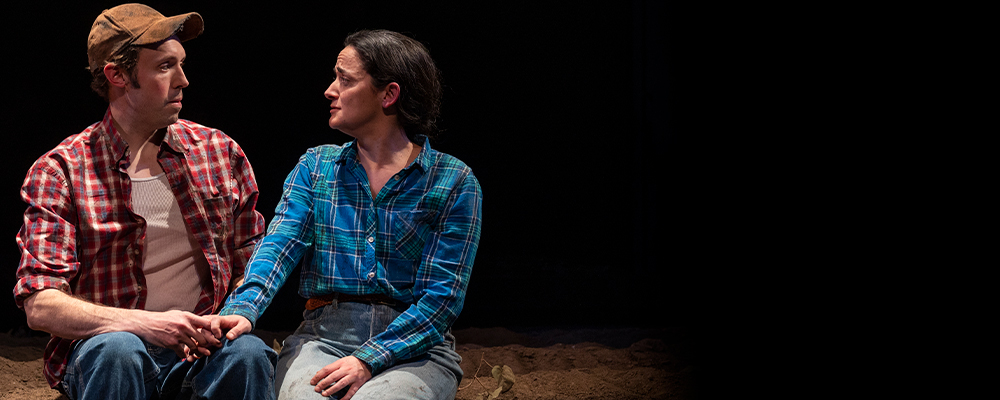
 [rating=4] Court Theatre, which won the 2022 Regional Theatre Tony Award, has always been on the forefront with their plays. This season they are presenting ” FEN” by Caryl Churchill, a British playwright known for dramatizing the abuse of power using feminist themes, and like this play, the complex relationships with each other, their hopes and their private lives. The play can at times be difficult, in the beginning, because there are 22 characters being played by just 6 actors.
[rating=4] Court Theatre, which won the 2022 Regional Theatre Tony Award, has always been on the forefront with their plays. This season they are presenting ” FEN” by Caryl Churchill, a British playwright known for dramatizing the abuse of power using feminist themes, and like this play, the complex relationships with each other, their hopes and their private lives. The play can at times be difficult, in the beginning, because there are 22 characters being played by just 6 actors.
The open set for this production is a Fen* and a farm. What is the difference? “A Fen is a type of peat-accumulating wetland fed by mineral-rich ground or surface water. It is one of the main types of wetlands along with marshes, swamps, and bogs. Bogs and fens, both are peat-forming ecosystems, also known as mires,” mostly found in Eastern England. A farm is just that, a farm where things are grown and animals raised.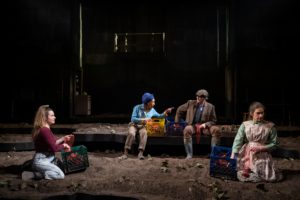
This is explained in the beginning of the play by the Businessman played by Alex Goodrich, who also plays 4 other characters including the main character, Frank. The theme for this play is what life is like working under a conglomerate who buys up all the land for miles and keeps the people in poverty working it. They are farmers, but in actuality, they are not in control.
Val played by Cruz Gonzalez-Cadel, one of the three main characters, is in love with Frank, who works on a different farm, and is married. His place on the farm is too small for his family so they live someplace else. It is however, big enough for Val to move into, to prevent her from leaving the area and to go to London to start a new life, leaving her two children in the care of her mother. Her mother is played by Elizabeth Laidlaw. Val is depressed. She wants a new life, and is a heart broken woman, who may be suicidal.
Nell played by Elizabeth Laidlaw is an older woman, a self-proclaimed troublemaker who is very independent. She is a villager, a laborer and the children of the area accuse her of witchcraft. Ms. Bourne plays Nell, May, and Mavis. The other two supporting cast members are Morgan Lavenstein and Genevieve Venjohson .These two women play eight characters and do a remarkable portrayal of both adults and children. I was amazed at their change in accents for both, and their mannerisms. Under the skillful direction of Vanessa Stalling, who found a way for these actors to portray the various characters so perfectly. Each one is so different from the other. and hats off to Collette Pollard , the scenic designer for the design of the set. They must have brought in about 2 tons of fresh dirt to make this production layered to look like a farm or a fen.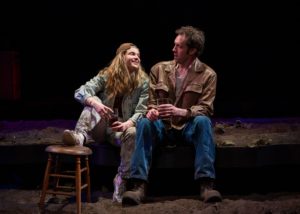
During the play you can see the workers picking potatoes from the earth, or bagging onions, or at the end picking flowers that grow magically from the earth. A very impressive job. And one more accolade goes to Jeffery Levin, the sound designer. Ever so quietly, in the background you can always hear birds, or water, or the wind blowing through the field, allowing the audience members to feel that they are “the fly on the wall, peering in to see what is taking place”. Even when the farmer takes off his headphones while driving a tractor on stage, you can hear the music coming from the headphones that he was listening to.
“Fen” is a hundred minutes long with no intermission. Parking is easy with a free light right next door on campus. Campus security is well seen, and we felt safe to enjoy this marvelous play.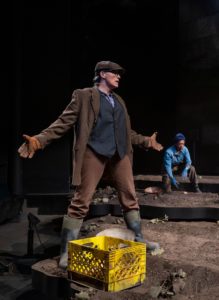
“FEN” will continue thru March 5th at The Court Theatre , located at 5535 S. Ellis Ave.
with performances as follows:
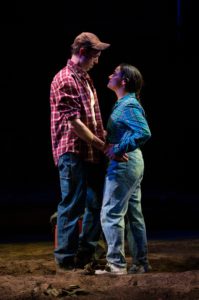 Wednesdays 7:30 p.m.
Wednesdays 7:30 p.m.
Thursdays 7:30 p.m.
Fridays 7:30 p.m.
Saturdays 2 p.m. and 7:30 p.m.
Sundays 2 p.m. and 7:30 p.m.
Tickets range from $40.50- $82.00 and are available at the box office 773-753-4472
or online at www.CourtTheatre.org
Discounts for students, seniors
To see what others are saying, visit www.theatreinchicago.com, go to Review Round-Up and click at “Fen”.
*In England, the largest such area is called the Fens, 300,000 acres of flat and sinking land, facing the North Sea from Cambridge to Lincoln.






More Stories
“The Firebugs” reviewed by Julia W. Rath
“The Book of Grace” Al Bresloff with another from Paul LIsnek
“The Last Five Years” MILWAUKEE